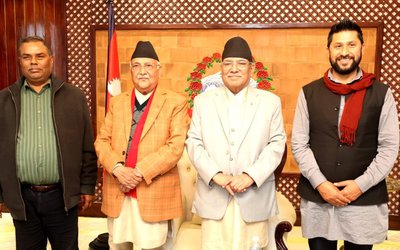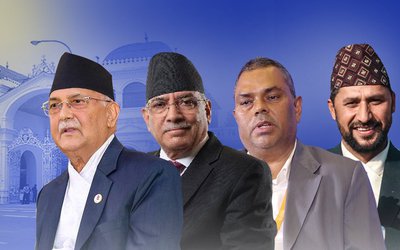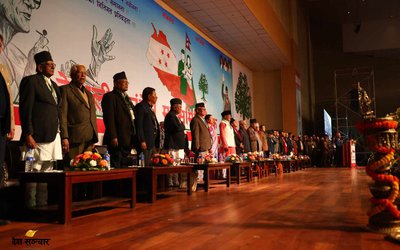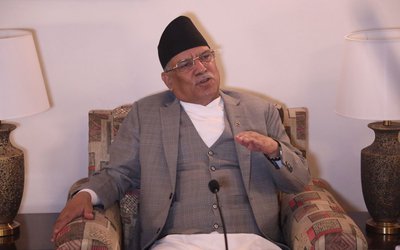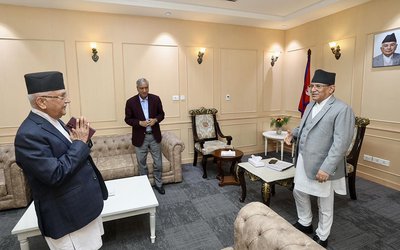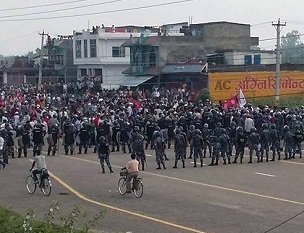
As Nepal’s politics is dictated by its geo-location rather than the real political situation, nothing can be ruled out as the country moves ahead in its political course. From alliance making to breaking, everything is possible here.
American professor late Leo Rose was the first to explain how geo-politics mattered in Nepal. In his book, Strategy for Survival, the author made it all clear.
The recent statement of CPN-UML leader and Deputy Prime Minister Bam Dev Gautam that the killing in Tikapur was part of an act conducted by persons entering from the southern border, spoke volumes about Nepal’s geo-politics.
Although India has expressed its rejoinder against Gautam’s statement, the government seems to be holding on to his words. Even leaders of Nepali Congress, CPN-UML and UCPN-Maoists are openly blaming Nepal’s southern neighbor for the present crisis.
In a recent quote in Annapurna Post, UCPN-Maoist chair Prachanda said that he was pressed by the Indian ambassador to hold the CA meeting for some weeks and allow tabling of drafts for a few more days. “There is a great international conspiracy against the new constitution. All of us need to vote to avoid the foreign game."
Sandwiched between two giants, Nepal has seen its political process always moving in unusual ways. For instance, three main parties in the mainstream alliance, Nepali Congress, CPN-UML and UCPN-Maoist, have nothing in common for they hold three completely different ideologies.
Despite its claims to be a champion of liberal democracy, Nepali Congress has no hesitation to follow the ideologies of UCPN-Maoist and CPN-UML. Compromising its own liberal and plural ideology, Nepali Congress has accepted the words proposed by UCPN-Maoist and CPN-UML on Socialism.
Similarly, UCPN-Maoist and CPN-UML believe in the communist ideology and regard themselves as the messiah of the oppressed, but both the parties have accepted the capitalist way of Nepali Congress.
The situation with the opposition group is no different. Tharus, Madheshis, Dalits and Janjatis have different demands, in contradistinction with each other's general positions. However, they are part of the same front. For instance, the Tharu groups are demanding from Jhapa to Kanchanpur as the Tharuhat Province, where Madheshis are demanding another province.
Similarly, Limbuwan is demanding eight districts east of Koshi to be declared as Limbuwan. Three districts of the plains, Jhapa, Morang and Sunsari, fall under this province. Although the demands of the Limbus, Tharus and Madheshis clash and contradict, they see no harm to be together against the Nepali state currently run by the three-party syndicate.
It is interesting to see that most of the communist parties receive a warm treatment in India. However, they thrive in Nepal by playing anti-Indian cards.
Compared to China, India, which shares open borders, common cultures and religions, has complex relations, including in security terms, with Nepal. India is in the forefront, whenever there is a political crisis.
Situated at the backwater of India and China’s Tibetan Autonomous Region, Nepal is not likely to see its current political turmoil end anytime soon. With the rainbow alliance of ideologically contradictory regional, political, religious and ethnic forces in the center of Nepal’s ruling and opposition politics, no one can avert Nepal’s prolonged and controlled political anarchy.
Given the current political demands of various forces and draft of the constitution prepared by three parties, what one can say is that no constitution can give a solution to the present politics. Nepal will have to pass through a long vicious cycle of instability and violence.
- TANAHU HYDROPOWER PROEJCT: A Significant Achievement
- Apr 15, 2024
- AMBASSADOR HANAN GODAR: Sharing Pain With A Nepali Family
- Mar 30, 2024
- VISIT OF KfW AND EIB TO NEPAL : Mission Matters
- Mar 25, 2024
- NEPAL BRITAIN SOCIETY: Pratima Pande's Leadership
- Mar 24, 2024
- NEPAL ARMY DAY: Time To Recall Glory
- Mar 15, 2024


